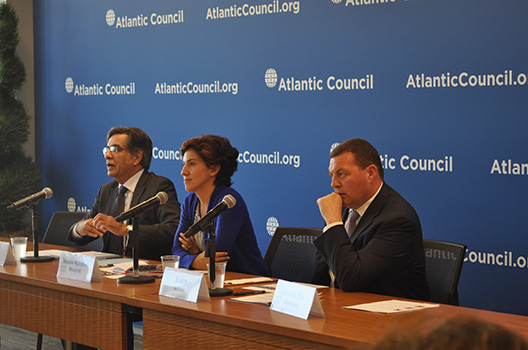 On October 13, 2015, the Atlantic Council’s Rafik Hariri Center for the Middle East launched “Tunisia: The Last Arab Spring Country,” the latest publication by Senior Fellow Karim Mezran and Nonresident Senior Fellow Mohsin Khan. In the issue brief, Khan and Mezran review Tunisia’s political and economic transition since its 2011 revolution and evaluate the impact of those policies in relation to current economic and security challenges. The authors find that, despite political successes, Tunisia is hampered by the absence of economic reforms, endangering all of its painstaking progress gained thus far.
On October 13, 2015, the Atlantic Council’s Rafik Hariri Center for the Middle East launched “Tunisia: The Last Arab Spring Country,” the latest publication by Senior Fellow Karim Mezran and Nonresident Senior Fellow Mohsin Khan. In the issue brief, Khan and Mezran review Tunisia’s political and economic transition since its 2011 revolution and evaluate the impact of those policies in relation to current economic and security challenges. The authors find that, despite political successes, Tunisia is hampered by the absence of economic reforms, endangering all of its painstaking progress gained thus far.
The Center hosted a roundtable discussion featuring Dr. Haykel Ben Mahfoudh, Hariri Center Nonresident Fellow and Professor of Public Law and Political Sciences at the University of Carthage in Tunis, and Dr. Mariem Mezghenni Malouche, Senior Economist at the World Bank and a founding member of Tunisian American Young Professionals.
Ben Mahfoudh began by looking back to the 2011 revolution where the idea of the revolutionaries, he reminded the audience, was to bring about change in all aspects of life. He believes Tunisians now have clarity about their political future and confidence in the political process, but the weakness of the transitional governments severely impacted the country’s ability to implement economic reforms. Ben Mahfoudh agreed with the authors in saying Tunisia now needs to deal with growing economic challenges in the country and bring real change. But to do so, the key question to Ben Mahfoudh is one of political will and capacity to bring change, not of security versus economy.
Malouche agreed with Ben Mahfoudh on the negative impact that transitional governments had on Tunisia’s economy. Malouche further pointed that Tunisia’s government even now operates with an administration weighed down by staff redundancies and over inflation, a need for more public communication and transparency, and executive and legislative members who are still learning their powers and responsibilities. Malouche raised the question of whether needed economic reforms can or should come about by consensus, in the manner of the political dialogue, but pointed out that this is a question Tunisians themselves must answer. Lastly, Malouche emphasized a Free Trade Agreement (FTA) with the United States as a measure that could bring enormous benefit to Tunisia, with “little impact” to the US economy.
In question and answer, Khan asserted that for Tunisia to convince the United States of the need to an FTA, those making Tunisia’s case should go beyond the political argument and instead prepare an in-depth technical report detailing the costs and benefits of such a deal for Tunisia.
For an in-depth assessment and analysis of Tunisia’s political and economic situation, read Mezran and Khan’s latest publication here.
